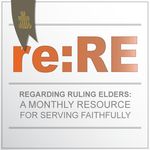The congregation I serve has a lot of ruling elders, and at no time is this more evident than on Ordination and Installation Sunday. Nearly half of the congregation comes forward to join in the laying on of hands on new ruling elders. I love the fact that our church leadership have decades and decades worth of a cloud of witnesses standing there with them as they enter the ordained ministry.
Because our congregation of 500 members has such a significant percentage of ruling elders, it is important to find ways to engage them in the life and leadership of the church beyond their time on session. The old adage is true: once an elder, always an elder. Their collective voice matters as we move forward in ministry.
There are three specific ways that our congregation taps into their collective history and knowledge, and reinforces the truism that they remain important leaders of our church long after completing their term(s) on session.
- College of Elders
This initiative came out of a conversation from one of our ruling elders who was no longer actively serving on session and shared my desire to tap into the institutional knowledge of those who had previously served. Each year, an annual dinner is held on a Sunday evening in September in our fellowship hall. The meal is catered and spouses are encouraged to attend. As pastor and teaching elder, I give a five- to ten-minute “state of the church” address, updating folks on what happened throughout the past year and what is coming up. A special guest is also invited to speak on some topic that people will find interesting. This past year, for instance, we had an assistant coach for the NBA’s Charlotte Hornets talk about being a person of faith in the world of professional sports.
These dinners have great attendance and ruling elders really look forward to them. While not a lot of work to plan and facilitate, the camraderie, goodwill, and faith development generated is well worth the effort to put together.
- Communion for the Homebound
Once a quarter, our ruling elders partner with the teaching elders to deliver communion to our homebound members. A concentrated effort has been made to tap into the College of Elders in addition to active session members. Many of our non-session elders enjoy being utilized—and, in most instances, are closely acquainted with the people we visit. Serving communion can be one of the best ways to emphasize a ruling elder’s calling to be a spiritual leader.
- Mentor Team
As part of my terms of call in coming to this congregation, a mentor team was formed that meets with me for lunch once a month, providing me feedback from trusted, thoughtful, honest partners in ministry. The team consists of six congregation members, half of whom are on session and half non-session ruling elders. I find the presence of the non-session elders offers me a very helpful perspective, as they are able to speak to the deep history and collective narrative of the congregation in ways others are not.
These are just a few ways that ruling elders who are no longer actively serving on session, this important cloud of witnesses, are included in the life and leadership of one congregation. How do they serve as leaders in your congregation?
Steve Lindsley serves as senior minister of Trinity Presbyterian Church of Charlotte (www.trinitypreschurch.org). An advisory team member for NEXT Church, Steve is passionate about helping congregations traverse the changing church and live into God’s vision and calling. Steve has also recorded five studio albums and has gigs regularly. For more information, visit www.stevelindsley.com.
For more about the information provided here, please contact Martha Miller at martha.miller@pcusa.org and browse the Ruling Elders website.

